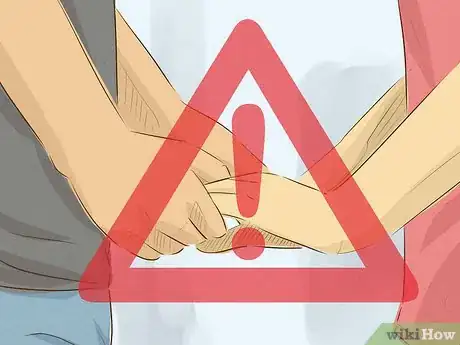This article was co-authored by Klare Heston, LCSW. Klare Heston is a Licensed Independent Clinical Social Worker based in Cleveland, Ohio. With experience in academic counseling and clinical supervision, Klare received her Master of Social Work from the Virginia Commonwealth University in 1983. She also holds a 2-Year Post-Graduate Certificate from the Gestalt Institute of Cleveland, as well as certification in Family Therapy, Supervision, Mediation, and Trauma Recovery and Treatment (EMDR).
There are 8 references cited in this article, which can be found at the bottom of the page.
This article has been viewed 14,042 times.
Sexual abuse has far-reaching, lasting effects on its victims, and the trauma they experienced can affect their romantic relationships as well. If you are romantically involved with someone who was a victim of sexual abuse, there are some special things to consider as you move forward in a relationship with them. Your partner will need you to practice good communication with them and they may also need some special accommodations. However, it is important to attend to your needs as well and take good care of yourself as you navigate your new relationship.
Steps
Supporting Your Partner
-
1Listen to your partner when they want to talk. Being available to listen to your partner when they need you is one of the most important ways that you can help them. If your partner wants to share something with you, put away your phone, turn off the TV, and focus only on them.[1]
- Face your partner, nod to show you are listening, and ask for clarification if something is unclear, such as by saying, “What do you mean?”
- Don't take it personally if your partner does not always want to talk with you. They may not feel ready and they may even try to push you away at times to avoid discussing painful memories.
Tip: Keep in mind that it is okay to tell your partner if you are uncomfortable or triggered by things they share. Being open about your feelings and experiences will lead to greater intimacy and trust. Remember, it's best for both of you to share your feelings.[2]
-
2Avoid pressuring your partner to talk or seek help if they are not ready. You cannot control what your partner does, and pushing your partner to see a therapist or to talk about their experience if they don't feel ready may upset them. Your partner is the one who is in control of their recovery. Let them know that you are there for them if they need you, but do not try to tell them what they should or should not do.[3]
- For example, if your partner tells you that they are thinking of seeing a therapist, you might say something like, “That's great. I'm so happy for you! Can I do anything to help?”
- Keep in mind that you might be the first person your partner has told about their sexual abuse.
Advertisement -
3Research problematic behaviors and ask how you can help. Find out what is common in your partner's situation, such as by searching the internet, reading books on the effects of sexual abuse, or talking with a therapist. If your partner develops an unhealthy behavior, you cannot force them to stop, but you can let them know that you have noticed and that you care about them. Ask them what you can do to help them if you notice your partner is:[4]
- Abusing alcohol or using drugs
- Gambling
- Working excessively
- Spending money indiscriminately
- Over-exercising
- Becoming preoccupied with food and body weight
- Self-harming, such as cutting
-
4Reassure your partner during a flashback or after a nightmare. Flashbacks and nightmares are common in people who have been sexually abused. Your partner may space out or wake up suddenly and seem very upset. If you are with your partner when they have a flashback or nightmare, speak to them gently and assure them that they are safe. Listen if they want to talk about it after, but don't pressure them if they would rather not.[5]
- Try saying something like, “What are you hearing? What are you feeling? I'm here for you. You're safe with me.”
- Or, you could say, “It was a dream. It's not real. You're here with me. You're safe.”
- Don't ignore these types of things when they happen. If you do, your partner will feel alone. Make sure you acknowledge that you understand they're going through something.
-
5Address any trust issues your partner may have. Victims of sexual abuse are more likely to have difficulty trusting in romantic relationships than other people. If you have encountered trust issues with your partner, try not to take it personally. Remind yourself that it is common, continue to behave in a trustworthy manner, such as by being honest, loyal, and dependable. Over time, your partner will see that you are worthy of their trust.[6]
- For example, if you say you will call at a certain time, make sure that you do. If you make plans together, keep them. If you promise to do something, do it.
-
6Anticipate mood swings and take them in stride. Mood swings are a common after-effect of sexual abuse. If your partner has a mood swing, remember that it is not about you.[7] Avoid mirroring your partner's mood, such as getting angry because they are angry. Instead, listen to them and be understanding.[8]
- Don't try to solve your partner's problems for them or force them to be in a good mood. This is likely to make them more upset.
Promoting Positive Intimacy
-
1Go slow and allow your partner to take the lead. Take it slow and get to know each other well before you develop an intimate relationship. If you and your partner become intimate or already are intimate, then you can let your partner know if you are in the mood. However, always remind them that it's okay if they are not and that there is no rush.[9]
- For example, if you started a sexual relationship with a past boyfriend or girlfriend at 3 months into the relationship, then you might plan to wait at least twice as long before you suggest becoming intimate with your current partner.
- Try saying something like, “I'm happy to take things slow so that you are comfortable.”
-
2Enjoy non-sexual intimacy with your partner. If your partner is having a hard time with sexual intimacy or if you have not reached that point in your relationship, then focus on non-sexual ways to be intimate with them. This will help to keep your relationship strong and build your connection without making your partner feel uncomfortable.[10]
- For example, you can be intimate by holding hands, kissing, cuddling, hugging, touching your partner gently, giving each other back massages, or even just sitting together and making eye contact.
Tip: Look for opportunities to simply laugh and have fun, too! Watch a comedy, listen to a comedy podcast, or tell your partner about something funny that happened at work.[11]
-
3Check in often during sex and ask if they need a break. When you are intimate with your partner, be open to the possibility that they might need a break, possibly even in the middle of lovemaking. Ask them if what you are doing is okay to check in with them during sex. You may also want to establish a special word or phrase that your partner can use to indicate they need a break.[12]
- Simply asking, "Is this okay?" and waiting for their response before continuing may help to promote a positive experience for you and your partner.
- Make sure to choose a word or phrase that will be easily recognizable, such as “break” or “I need a break.”
-
4Stop if your partner asks you to stop. There may be times when your partner wants more than a break and will need to stop in the midst of making love. Stop immediately if your partner says “stop!” Give them some space, and let them know you will not do anything they don't want to do.[13]
- For example, you could say, “Stopping right now. It's okay. I don't want to do anything you don't want.”
- Try not to take it personally if your partner asks to stop. Remember, this is not about you or because of something you did.
-
5Respect your partner's requests for a period of sexual abstinence. At some point, your partner may ask you to forego sex for a period of time while they work through some things. Respect their request and try to be patient during this period of voluntary abstinence.[14]
- Do not pressure your partner to resume a sexual relationship with you! Just let them know that you will be there when they feel ready.
Taking Care of Yourself
-
1Express your feelings in a healthy way as you show empathy. If you are experiencing feelings of anger, sadness, or frustration due to what your partner endured, make sure to express them in a healthy way. Write about your feelings in a journal, talk to a trusted friend, or go for a run to help yourself blow off some steam. Show empathy for them and what they have been through, but don't let anger about what happened to them take over your emotions.[15]
- Avoid using alcohol, drugs, food, or other vices as a coping mechanism.
-
2Maintain a separate identity and see that your needs are met. You may sometimes feel as though your partner's identity and yours are intertwined, and this is not healthy. Make sure that you are making time for you, meeting your own needs, and working towards your personal goals.[16]
- For example, set aside a day or a few hours per week to do the things that you love to do.
Tip: Remember that your feelings matter, too! If you are feeling stressed or overwhelmed, let your partner know and tell them how they can support you.
-
3Request a window where your partner will not discuss abuse, if needed. Your partner may want to talk about past sexual abuse often. If this overwhelms you sometimes, then is okay for you to let your partner know that you need a break. Ask to make certain days or daily time frames only for discussing your interests, telling each other funny stories, and enjoying each other's company.[17]
- For example, you might suggest the hours of 7pm to 11pm on weekdays, or suggest taking off Mondays, Thursdays, and Saturdays.
- Check in with your partner to make sure they're okay with this. Say, "Is this okay with you?"
-
4See a therapist to discuss your emotions. You may consider seeing a therapist to discuss your feelings and to help you navigate the intricacies of your relationship. Having the guidance of a professional may help to make it easier for you to support your partner, process your feelings, and develop healthy coping mechanisms. This may lead to a healthier, happier relationship overall.[18]
- For example, a therapist can teach you positive techniques for dealing with anger and frustration over your partner's past abuse.
- Look for a therapist who has experience working with victims of sexual abuse and their partners.
-
5Be aware that the relationship might not work out. Relationship issues are common when one of the partners has experienced sexual abuse. This is unfortunate, but it is important to recognize that the relationship may not work out. Your partner may not be ready for an intimate relationship at this point in their life.[19]
- If the relationship does not work out, know that you did your best to make it work, but it is time to move on.
- You may want to try couple's counseling if you and your partner are having difficulties. This can help you work through what happened to your partner in the past and build a stronger relationship moving forward.
References
- ↑ http://www.ksacc.ca/docs/when_your_partner_was_sexually_abused_as_a_child.pdf?LanguageID=EN-US
- ↑ https://www.canada.ca/en/public-health/services/health-promotion/stop-family-violence/prevention-resource-centre/children/males-sexually-abused.html#How1
- ↑ https://www.psychologytoday.com/us/blog/all-about-sex/201610/childhood-sexual-abuse-how-men-can-help-women-recover
- ↑ https://www.livingwell.org.au/relationships/info-for-partners-relationship-challenges/
- ↑ https://www.psychologytoday.com/us/blog/all-about-sex/201610/childhood-sexual-abuse-how-men-can-help-women-recover
- ↑ https://aifs.gov.au/cfca/publications/long-term-effects-child-sexual-abuse/interpersonal-outcomes
- ↑ https://www.samuelmerritt.edu/sexual_violence/effects
- ↑ https://www.psychologytoday.com/us/blog/happiness-in-world/201306/how-manage-your-partners-bad-moods
- ↑ https://www.psychologytoday.com/us/blog/all-about-sex/201610/childhood-sexual-abuse-how-men-can-help-women-recover
- ↑ https://www.psychologytoday.com/us/blog/all-about-sex/201610/childhood-sexual-abuse-how-men-can-help-women-recover
- ↑ https://www.dabs.uk.com/information/guidance-for-partners-of-survivors-of-childhood-abuse
- ↑ https://www.psychologytoday.com/us/blog/all-about-sex/201610/childhood-sexual-abuse-how-men-can-help-women-recover
- ↑ https://www.psychologytoday.com/us/blog/all-about-sex/201610/childhood-sexual-abuse-how-men-can-help-women-recover
- ↑ http://www.ksacc.ca/docs/when_your_partner_was_sexually_abused_as_a_child.pdf?LanguageID=EN-US
- ↑ https://www.psychologytoday.com/us/blog/all-about-sex/201610/childhood-sexual-abuse-how-men-can-help-women-recover
- ↑ http://www.ksacc.ca/docs/when_your_partner_was_sexually_abused_as_a_child.pdf?LanguageID=EN-US
- ↑ https://www.psychologytoday.com/us/blog/all-about-sex/201610/childhood-sexual-abuse-how-men-can-help-women-recover
- ↑ http://www.ksacc.ca/docs/when_your_partner_was_sexually_abused_as_a_child.pdf?LanguageID=EN-US
- ↑ https://www.psychologytoday.com/us/blog/all-about-sex/201610/childhood-sexual-abuse-how-men-can-help-women-recover











































































